▼ PPA suspends Pema Khandu, 6 others for anti-party activities [12-30-16]
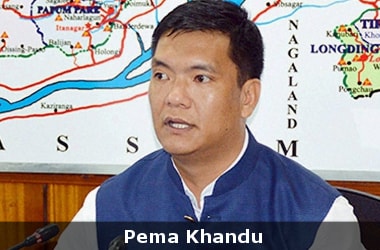 Peoples’ Party of Arunachal (PPA) on 29 December 2016 suspended Chief Minister Pema Khandu along with six other MLAs from the primary membership of the party. They were suspended due to anti-party activities. Peoples’ Party of Arunachal (PPA) on 29 December 2016 suspended Chief Minister Pema Khandu along with six other MLAs from the primary membership of the party. They were suspended due to anti-party activities.
With this suspension, CM Khandu ceased to be the leader of the PPA Legislature Party.
Others suspended from the party include Deputy Chief Minister Chowna Mein and MLAs, namely Chow Tewa Mein, Passang Dorjee Sona, Jambey Tashi, Zingnu Namchom and Kamlung Mossang.
PPA President Kahfa Bengia said they were placed under temporary suspension from the primary membership of the party with immediate effect.
Disciplinary proceedings will be initiated against them.
Bengia also said that the party would elect a new legislature party leader.
Know More about Pema Khandu & PPA
- On 17 July 2016, Khandu replaced Nabam Tuki as the Chief Minister of the state.
- Pema Khandu, the son of the former CM late Dorjee Khandu, is one of the 42 former Congress leaders who rebelled from the party.
- He joined PPA in mid-September 2016.
- PPA is a regional political party in Arunachal Pradesh.
- It was founded by Bakin Pertin and Tomo Riba in 1979.
- At present, the party is a member of the North East Democratic Alliance (NEDA), a political coalition formed by the Bhartiya Janata Party along with several other regional parties.
|
▼ Enemy Property Fifth Ordinance, 2016 passed [12-26-16]
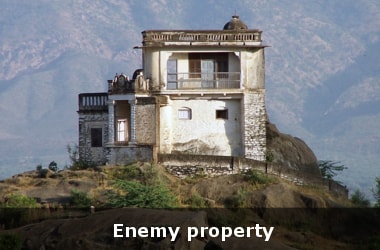 President of India on 22nd December, 2016 passed the Enemy Property (Amendment and Validation) Fifth Ordinance, 2016 (8 of 2016). President of India on 22nd December, 2016 passed the Enemy Property (Amendment and Validation) Fifth Ordinance, 2016 (8 of 2016).
Following the Indo-China aggression in 1962, specific properties of Chinese nationals in India were vested in the Custodian through Defence of India Rules 1962.
Following the Indo-Pak wars in 1965 and 1971, the movable and immovable properties of Pakistani nations was vested in the Custodian of Enemy Property for India.
Their vesting was continued in the Custodian by the Enemy Property Act, 1968.
Government of Pakistan has disposed of all the properties of Indians impounded by them.
Claims are therefore being made to regain properties by legal hairs and successors of enemy nationals.
To prevent the vested properties, the Ordinance for the first time was promulgated on 7th Jan 2016.
It was passed by the LS on March 9, 2016.
Ordinance was promulgated for the second time on April 2nd, 2016.
The Ordinance was then issued for the third time on 31st May 2016 incorporating the amendments.
As the Bill is not being considered by RS, the ordinance was promulgated on 28th Aug 2016 for the fourth time.
The amendments are aimed at plugging the loopholes in the principal Act to ensure that the enemy properties worth thousands of crores of rupees vested in the Custodian do not revert to the enemy, enemy subject or enemy firm.
Thus, in the larger public interest and to safeguard the interest of Central Government, the Enemy Property (Amendment and Validation) Fifth Ordinance, 2016 (8 of 2016) has been promulgated.
Indo-Pak Wars
- War of 1947.
- War of 1965.
- War of 1971.
- Siachen conflict.
- Kargil War.
- 2001–02 standoff.
- 2008 standoff.
- Border skirmishes. 2011. 2013. 2014–15. 2016 confrontation.
|
▼ 17 sub-castes in OBC category transferred to SC in UP [12-26-16]
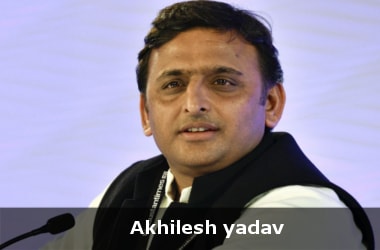 UP’s Samajwadi Party led government on 22nd Dec 2016 passed a resolution to transfer 17 sub-castes in Other Backward Castes into Scheduled Castes category. UP’s Samajwadi Party led government on 22nd Dec 2016 passed a resolution to transfer 17 sub-castes in Other Backward Castes into Scheduled Castes category.
Decision was taken at a cabinet meeting chaired by CM Akhilesh Yadav.
The inclusion of sub castes into the SC category was one of the main commitments of the SP government in 2012 when it attained power.
17 sub-castes which the government wants to be included in the SC category include: Kashyap, Kewat, Batham, Gaur, Kahar, Nishad, Bind, Bhar, Rajbhar, Rapajapati, Majhi, Tura, Mallah, Kumhar, Dheemar, Machua
Along with this, the state government also moved another resolution to send this proposal to the Union Government for further consideration.
Inclusion of these 17 sub-castes into SC category now rests with the Union Government.
This marks the second time the SP government has made an attempt in this direction.
The decision was taken without the consent of the Union government. The Allahabad HC quashed the decision declaring the move unconstitutional and void.
The two main supplementary legislations included the Central GST Bill and the State GST Bill.
Council will also meet to sort out the issue of dual control or cross empowerment.
|
▼ Najeeb Jung resigns from post of LG-Delhi [12-23-16]
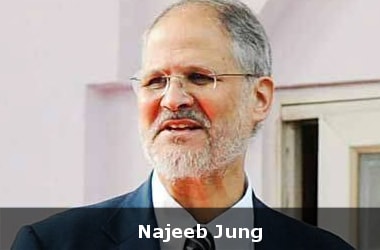 Lieutenant Governor of Delhi Najeeb Jung submitted his resignation to the Union Government on 22 December 2016. Lieutenant Governor of Delhi Najeeb Jung submitted his resignation to the Union Government on 22 December 2016.
He resigned 18 months short of his tenure.
In an official press release, he thanked Prime Minister Narendra Modi for all his cooperation during his tenure as Lt Governor.
He also thanked Arvind Kejriwal, the Chief Minister of Delhi, for his association in past two years and people of Delhi for their support especially during the one year’s President Rule in Delhi.
He was serving Delhi as its 20th LG of the National Capital Territory of Delhi.
He assumed charge of Lt Governor of Delhi on 9 July 2013.
He also served Jamia Millia Islamia (JMI) as its 13th Vice-Chancellor between 2009 and 2013.
JMI is a central university in Delhi.
A former civil servant, he was a 1973 batch MP cadre IAS officer.
|
▼ Maharashtra to get separate ministry for OBC [12-22-16]
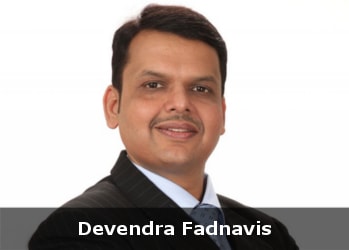 Maharashtra Chief Minister Devendra Fadnavis on 20 December 2016 announced that a separate Ministry will be created for Other Backward Classes (OBCs). Maharashtra Chief Minister Devendra Fadnavis on 20 December 2016 announced that a separate Ministry will be created for Other Backward Classes (OBCs).
This ministry will be headed by an independent minister.
Besides, the Chief Minister also announced funds worth Rs 200 crore for gravity-based water supply projects. These projects will help in fulfilling the need of the town and surrounding areas.
Zila Parishad of Thane to prepare a tourist circuit plan for Murbad and Shahpur talukas. He assured that maximum funds will be provided for the development of the plan.
Other Backward Classes (OBC)
- OBC is a collective term to classify caste that is socially and educationally disadvantaged.
- The Mandal Commission report of 1980, found that the OBC list comprises of 52 percent of the country’s population.
- The figure shrunk to 41 percent by 2006, when the National Sample Survey Organisation took place.
- They are entitled to 27 percent reservations in public sector employment and higher education.
- Constitutionally, OBC is described as socially and educationally backwards class.
|
▼ High level inter-ministerial task force on Indus Water Treaty formed [12-21-16]
 Union Government on 17th Dec 2016 formed a high level inter-ministerial task force to look into important aspects of the Indus Water Treaty/IWT with Pakistan. Union Government on 17th Dec 2016 formed a high level inter-ministerial task force to look into important aspects of the Indus Water Treaty/IWT with Pakistan.
This task force will be headed by PM Narendra Modi’s Principal Secretary Nripendra Mishra.
Other members of the team include NSA Ajist Doval, Foreign Secretary S. Jaishankar and Secretaries in Ministries of Finance, Environment, Power and Water Resource.
Chief Secretaries of J&K and Punjab will be part of the task force.
J&K and Punjab are the states from where the six Indus river systems flow.
Committee was formed following the review meeting in Sept 2016 on the 56-year old distribution pact with Pakistan.
Meeting was held to utilise maximum water of Pak controlled rivers including Jhelum.
Pakistan in Sept 2016 approached the World Bank, saying the Kishenganga project was not in line with the criteria laid down under Indus Water Treaty.
After this, the World Bank decided to send an expert to discuss the Kishenganga and Ratle projects constructed in J&K.
World Bank is also a member of the Indus Waters Treaty signed between India and Pakistan in 1960.
This has a role in the process of resolution of differences and disputes.
Indus Waters Treaty
- Water distribution treaty between India and Pakistan brokered by WB(IBRD).
- Signed on: Sept 19, 1960.
- Signatories: PM Jawaharlal Nehru and President Ayub Khan
- Agreement holds control of three eastern rivers is with India, while three western rivers is Pakistan.
- Three eastern rivers are Ravi, Beas and Sutlej.
- Three western rivers are Indus, Chenab and Jhelum.
- As per the provisions in the treaty, India can use only 20% of the total water carried by the Indus river.
|
▼ Unauthorised Sharia courts in TN banned by Madras HC [12-21-16]
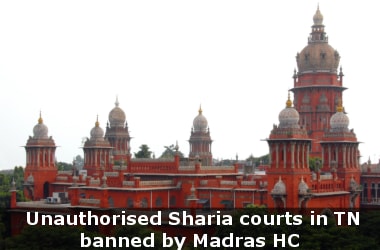 Madras HC on 19th Dec 2016 banned the unauthorised functioning of Sharia courts in Tamil Nadu. Madras HC on 19th Dec 2016 banned the unauthorised functioning of Sharia courts in Tamil Nadu.
The ruling came after a petition filed by 29-year-old Abdul Rahman who alleged he had been forced to divorce his wife by one such court.
Bench ordered a ban on all such courts functioning in an non authorised manner on the premises of mosques in the city.
Bench also stated religious places are only meant for religious purposes and asked the state government to ensure such courts do not function.
Bench also demanded status report from the police within 4 weeks.
Court at the Makka Masjid Shariat Council on Mount Road Chennai mandated on marriage and passed divorce orders much like a regular court.
According to A Sirajudddin, Rahman’s lawyer, the plaintiff approached the Sharia Court to resolve his marital issues and reunite with his wife.
However, the court forced him to sign a consent letter for talaq and pronounced talaq on his behalf, showing the letter as a proof of his consent.
What is Sharia Court?
- It follows Sharia law governing members of Islamic faith worldwide.
- Ruling is religiously binding on all believers.
- Courts cover personal and public matters such as: Crime, Politics, Marriage contracts, Prayer, Fasting, Trade regulations, Religious prescriptions, and Hygiene.
|
▼ Haryana launches Mahila Police Volunteer initiative for women safety [12-16-16]
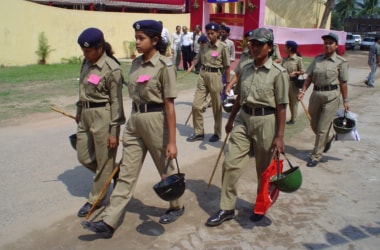 Government of Haryana on 14th Dec 2016 launched the Mahila Police Volunteer initiative for the safety of women. Government of Haryana on 14th Dec 2016 launched the Mahila Police Volunteer initiative for the safety of women.
The initiative was launched by Haryana CM Manohar Lal Khattar.
Haryana has become the first state in the country to adopt this scheme.
This scheme is part of a number of initiatives to achieve gender equality.
Mahila Police Volunteer scheme is a joint initiative of WCD and MHA ministry.
Its aim is to create a link between police authorities and local communities in villages.
Specially trained women volunteers will be appointed by the state government- target is to appoint at least a single volunteer in every village.
Primary job of a volunteer is to keep an eye on situations where women in the village are harassed or their rights and entitlements are denied.
The volunteers are selected through a procedure from among empowered, responsible and socially aware women who will facilitate police outreach on gender issues.
Volunteers are trained by respective state police authorities on their roles and responsibilities.
Government Gender Empowerment programs
National Policy for Women was launched on May 2016.
It identifies 7 priority areas, namely:
1. Health including food security and nutrition,
2. Education,
3. Economy,
4. Governance and Decision Making,
5. Violence against Women,
6. Enabling environment and
7. Environment and Climate Change.
- Bechi Bachao Beti Padhao was launched in Oct 2014.
- It addresses the issue of falling sex ratio.
- Participation of women in police force is set to be 33 percent.
|
▼ MEA Minister Sushma Swaraj is one of 15 "Global Thinkers" of 2016 [12-15-16]
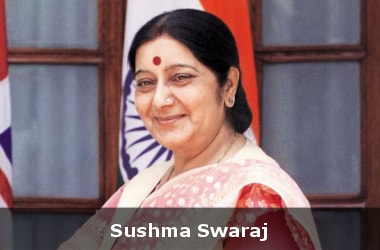 "For fashioning a novel brand of Twitter diplomacy+ ", Foreign Affairs magazine has named external affairs minister Sushma Swaraj one of 15 'Global Thinkers' of the year. "For fashioning a novel brand of Twitter diplomacy+ ", Foreign Affairs magazine has named external affairs minister Sushma Swaraj one of 15 'Global Thinkers' of the year.
This placed Swaraj, who's in the august company of 14 other notable thinkers including Hillary Clinton, Angela Merkel and Justin Trudeau.
The external affairs minister has helped both Indians and non-Indians.
She tweeted to roughly 6 million followers.
Swaraj, whom the Washington Post called "Supermom of the State", underwent a kidney transplant four days ago.
She is recovering well.
|
▼ Indian government takes preventative measures against hacker group Legion [12-14-16]
 In view of the several hacking incidents in the country by the so-called hacker group 'Legion', the ministry of electronics and IT has ordered a series of measures. In view of the several hacking incidents in the country by the so-called hacker group 'Legion', the ministry of electronics and IT has ordered a series of measures.
This includes audit of the financial sector starting immediately with the National Payment Corporation of India (NPCI), review of the IT Act to make it stronger and setting up a crack team to respond to unusual incidents on a war footing.
Social networking site Twitter has also been asked to strengthen its network and all stakeholders of the financial industry including payment and wallfirm have been asked to immediately report any incident.
A digital payment section has been created in CERT-In, an agency which monitors the Internet traffic on a real time basis given the ongoing momentum in cashless payments in the country. “
Under the IT Act it is mandatory for all institutions to report cyber incidents to CERT-In, however prompt reporting of such incidents, especially by banks has not happened in the past.
Prasad said that all digital payment firms have been asked to report any unusual movement immediately to CERT.
Legion
- Hacker group.
- So far hacked:
- Twitter accounts of Congress vice president Rahul Gandhi's,
- official account of Indian National Congress,
- liquor baron Vijay Mallya,
- journalists Barkha Dutt and Ravish Kumar
- news channel NDTV
- NPCI, IRDBT and a popular e-wallet firm's servers are compromised, and have been attacked at the root level.
- IDRBT is a technology service provider for banks in India.
|
▼ Haryana CM approves National Hydrology Project [12-9-16]
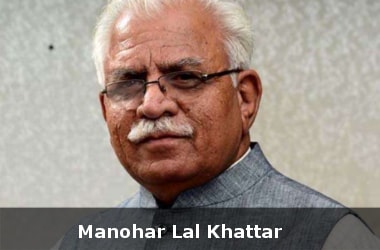 Haryana CM Manohar Lal Khattar has given approval for implementation of the INR 50-crore National Hydrology Project to be set up in the state with 100 per cent assistance from the Centre. Haryana CM Manohar Lal Khattar has given approval for implementation of the INR 50-crore National Hydrology Project to be set up in the state with 100 per cent assistance from the Centre.
The project aimed at improving the extent, quality and accessibility of information about water resources, and strengthening the capacity of water resource management institutions in the country.
The direct beneficiaries of the project include central and state implementing agencies responsible for surface and/or ground water planning and management.
The final beneficiaries would be farm communities selected for pilot projects, rural and urban water and power users and people affected by floods and droughts, and such families may benefit from improved irrigation water supply and management.
The central assistance had been allotted to Haryana for implementation of the project in four components -
- Improving water resources monitoring system,
- Water resources information system,
- Water resources management application and
- Institutions and capacity building.
MOA has been signed under the National Hydrology Project between Principal Secretary, Irrigation and Water Resources Department, Haryana and the Joint Secretary, Union Ministry of Water Resources, River Development and Ganga Rejuvenation. The aim is to set up monitoring networks in Haryana, with a focus on deploying new sensors, data storage and telemetry technologies across the state. The goal is to establish comprehensive, modern and automated real-time monitoring systems for surface and ground water.
|
▼ Triple Talaq declared unconstitutional [12-9-16]
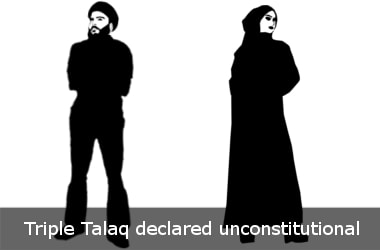 Allahabad HC on Dec 8, 2016 declared Triple Talaq was unconstitutional. The single judge bench of Justice Sunit Kumar observed that no Personal Law Board is above the Constitution. Allahabad HC on Dec 8, 2016 declared Triple Talaq was unconstitutional. The single judge bench of Justice Sunit Kumar observed that no Personal Law Board is above the Constitution.
The verdict was pronounced while deciding two separate writ petitions that the ‘Triple Talaq’ practice, violated the rights of Muslim women. Triple Talaq is sanctioned under Muslim personal law that governs marriage, property and divorce.
Triple Talaq’ has been challenged in the Supreme Court of India by several women.
The Union Government has told the top court that it is against gender justice, equality and the Constitution.
It had held that that the issue of the validity of triple talaq, polygamy and nikah halala should be considered in accordance with the principles of gender justice, dignity and equality.
Triple Talaq
- Islamic practice of divorcing women.
- Husband has to pronounce the world talaq three times to divorce women.
- Judgement a major boost for women’s rights.
- AIMPLB- All India Muslim Personal Law Board regulates this law.
- It follows triple talaq as per the Shariat.
|
▼ Ottakkara Panneerselvam is new TN CM [12-6-16]
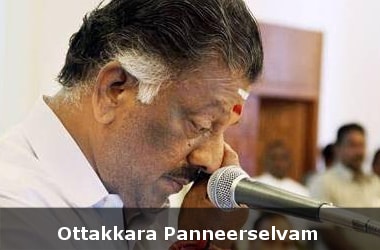 Ottakkara Panneerselvam, a trusted lieutenant and staunch loyalist, who stood in for party chief J Jayalalithaa thrice during crises became the state’s new CM. Ottakkara Panneerselvam, a trusted lieutenant and staunch loyalist, who stood in for party chief J Jayalalithaa thrice during crises became the state’s new CM.
Finance minister O Panneerselvam was sworn in as CM by Governor Vidyasagar Rao at Raj Bhavan. Earlier, AIADMK MLAs elected OPS as legislature party leader at a meeting held at the party headquarters in the city.
He's now the party's unanimous choice of legislature party leader and 8th TN CM.
On October 12, 22 days after Jayalalithaa was hospitalised, OPS was again given charge of her portfolios, including home and police, besides the task of presiding over cabinet meetings.
His two terms as caretaker CM were non-controversial.
The tea vendor-turned-politician also won the trust of Sasikalaa, when he managed the LS poll campaign of Sasikalaa's nephew, T T V Dinakaran from Periakulam.
|
▼ Govt approves India’s stance at Kigali agreement [12-2-16]
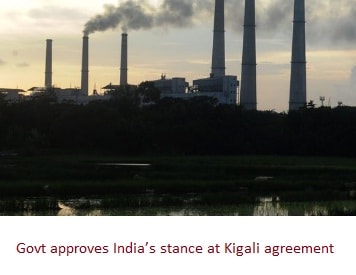 The government on Dec 2nd gave its ex-post facto approval to the India's position at recent negotiations at Kigali, Rwanda over the issue of phasing down the climate-damaging refrigerants hydrofluorocarbons (HFCs). The government on Dec 2nd gave its ex-post facto approval to the India's position at recent negotiations at Kigali, Rwanda over the issue of phasing down the climate-damaging refrigerants hydrofluorocarbons (HFCs).
The Kigali meet occurred during October 6-14 where India had successfully negotiated the baseline years and freeze year for phasing down the use of HFCs.
The country's position is aimed at allowing sufficient room for growth of its domestic sectors using refrigerants.
Freezing year is the year when use of HFCs will peak before being scaled down.
Baseline years are the years for which the average production\consumption quantity of HFCs is taken as the upper limit (serves as a level).
Two set of baselines years are there for developing countries.
India along with nine other countries will have baseline years of 2024-26 while other developing countries including China (largest producer of HFCs in the world), Brazil and South Africa will have 2020-22 baseline.
The developed countries, led by the US, will on the other hand reduce use of HFCs over a 2011-13 baseline.
The freezing year for India will be 2028, with a condition that there will be a technology review in 2024/2025 and, if the growth in the sectors using refrigerants is above certain agreed threshold, India can defer its freeze up to 2030.
The freezing year of China, Brazil, South Africa and others will be 2024.
The Kigali amendments to the Montreal Protocol will also, for the first time, incentivise improvement in energy efficiency in case of use of new refrigerant and technology.
Kigali Agreement
- The negotiations at Kigali were aimed at including HFCs in the list of chemicals an phasing them out.
- This is under the Montreal Protocol.
- India will complete its phase down in four steps with cumulative reduction of:
a. 10% in 2032,
b. 20% in 2037,
c. 30% in 2042 and
d. 85% in 2047.- Developed countries US, Japan and west EU will lower production and consumption of HFCs by 70% in 2029 and 85% by 2036.
|
▼ SYL (Sutlej-Yamuna Link) land acquisition put on hold [12-2-16]
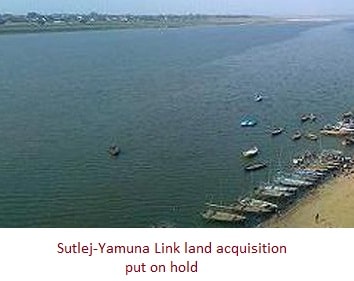 SC on 30th Nov 2016 ordered status quo on land acquired for the construction of the Sutlej Yamina Link canal stretch in Punjab. SC on 30th Nov 2016 ordered status quo on land acquired for the construction of the Sutlej Yamina Link canal stretch in Punjab.
Court also appointed Union Home Secretary, Chief Secretary of Punjab and DG Punjab Police as the receivers in the dispute between Punjab and Haryana.
It also sought a report on the present status of the land.
It was also declared that receivers cannot take over possession of land meant for the canal project. They have been appointed for submitting a report on the ground situation.
The SYL Canal Dispute
- Nov 2016: 5 judge bench set aside Punjab Termination of Agreement Act 2004.
- The act unilaterally terminated the 1981 water sharing pact with Haryana.
- Punjab govt than denotified the land acquired for the canal project and returned it to owners free of cost.
- 1981 water sharing agreement came into force when Haryana was removed out of Punjab in 1966.
- Haryana has constructed the portion of SYL canal in its territory.
- Congress Govt terminated the 1981 agreement for sharing waters of rivers Ravi and Beas in 2004.
- Punjab has stopped construction in SYL canal project presently.
|
| Chronology of events |
|
Delhi HC has ruled that son, irrespective of his marital status, has no legal right to live in his parent’s house self-acquired by the father/mother.
|
|
Vijaywada became the parliamentary constituency which is India’s first to have health insurance for all i.e 100 percent health coverage.
|
|
PM Narendra Modi's decision to discontinue 500 and 1000 rupees notes has boosted the revenue of many civic bodies in Maharashtra.
|
|
Nitin Gadkari has laid the foundation stones for 17 road projects costing around INR 1152 Cr in-Manipur.
|
|
The Delhi HC ruled that a child born out of rape is entitled to compensation that is independent of any such relief granted to the mother.
|
|
The HC of Chhattisgarh that issued a notice to the state government seeking its reply over the appointment of 11 MLAs as Parliamentary Secretaries.
|
|
SC has dismissed the plea of BCCI to review its July 18 verdict directing the cricket body to implement Lodha panel recommendations for structural reforms in BCCI.
|
|
Haryana government has issued petro cards to drivers in the state for cashless payments for fuel. For this purpose two oil companies, Indian Oil and Bharat Petroleum were shortlisted.
|
|
The Andhra Pradesh state government plans to equip the Rythu Bazaars in all 13 districts of AP with Wi-Fi facilities soon in a bid to encourage cashless transactions among the customers and traders.
|
|
Maharashtra Government has decided to create a new ministry for welfare of Vimukta Jati and Nomadic Tribes (VJNT), Other Backward Classes (OBCs) and Special Backward Classes (SBCs)
|